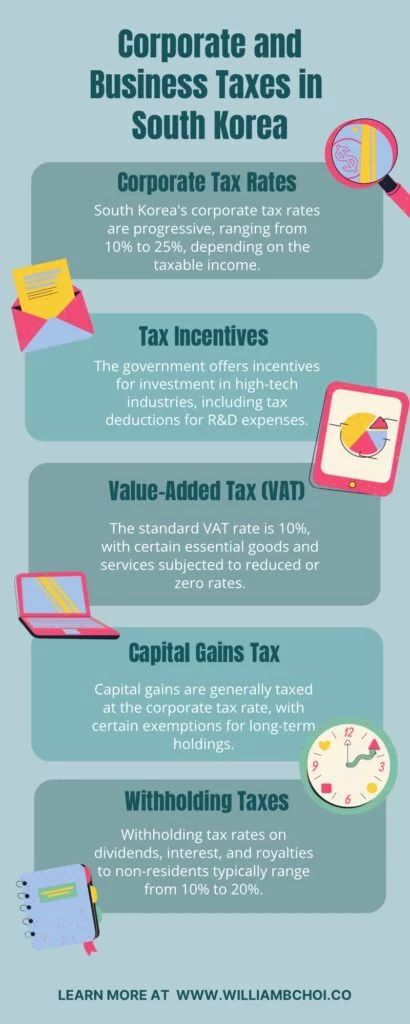Understanding Corporate and Business Taxes in South Korea
In this article, we delve into the intricate world of corporate and business taxes in South Korea, a crucial topic for tech startups and SMEs poised to make their mark in this vibrant market. We will also unravel the intricacies of tax compliance and the benefits of strategic tax planning, ensuring that your entrepreneurial journey in South Korea is both profitable and compliant.
Understanding the tax landscape is paramount in South Korea’s dynamic economy, where innovation is met with robust regulatory frameworks. Navigating these waters can be daunting, but it’s a rite of passage for businesses aiming to thrive.
Remember, taxation isn’t just about meeting legal obligations; it’s about understanding a pivotal aspect of the local business culture. By aligning with South Korea’s tax system, companies signal their commitment to corporate responsibility and economic partnership.
At the helm of guiding you through these complexities is William B. Choi, a luminary whose insights have earned him a spot among FORTUNE Magazine’s 2017 South Korean Top 30 Leaders. Our firm is dedicated to empowering tech startups and SMEs with the knowledge to capitalise on South Korea’s promising market.
We don’t just advise; we mentor and partner with visionaries to foster growth and innovation. If you’re seeking to understand how we can illuminate the path to tax efficiency and compliance for your venture, reach out to us.
Understanding the Corporate Tax Structure of South Korea
Navigating South Korea’s corporate tax structure is essential for businesses to harness the full potential of this economically robust region, ensuring compliance and maximizing benefits. Let’s talk about it in detail:

The Corporate Income Tax Framework
Resident corporations in South Korea are taxed on their worldwide income, while non-resident corporations are taxed only on their income originating within the country. The corporate income tax (CIT) rates are applied progressively, with the current rates for the fiscal year starting on or after 1 January 2023 as follows:
- 0 to 200 million KRW: 9%
- Over 200 million to 20 billion KRW: 19%
- Over 20 billion to 300 billion KRW: 21%
- Over 300 billion KRW: 24%
It’s essential to note that these rates do not include local income tax, which is levied additionally and ranges from 0.9% to 2.4% depending on the income bracket.
Incentives for SMEs
South Korea offers a range of tax deductions and credits to stimulate business growth, particularly for small and medium-sized enterprises (SMEs). For instance:
- SMEs can benefit from a tax deduction ratio ranging from 5% to 30%, based on factors such as corporate location, size, and business types, with a maximum cap of 100 million KRW.
- New startup SMEs can enjoy a reduction in CIT ranging from 50% to 100% for the first five years, under certain conditions.
These conditions include being located outside metropolitan and overpopulated areas and engaging in specified businesses, such as manufacturing, mining, and certain service industries.
Investment Tax Credits
The Korean government also provides incentives for investments in specified categories of facilities and business assets. The integrated investment tax credit system simplifies the process by applying a negative list system, where tax credits are available for most business-purpose tangible assets and specific intangible assets, excluding those prohibited under tax laws.
Qualifying investments can attract a basic credit, plus an additional credit for incremental investment over the average investment of the previous three years. The basic credit rates and additional credit rates vary, with enhanced benefits for investments in national strategic technologies such as semiconductors, secondary batteries, and vaccines.
The corporate tax structure of South Korea is structured to foster growth and innovation, particularly for SMEs and startups. By understanding the nuances of this system, companies can make informed decisions that align with their growth strategies and regulatory requirements.
Special Tax Considerations for Tech Startups and SMEs
In South Korea, the government has enacted several tax reforms to bolster the growth of tech startups and SMEs. These reforms offer a suite of benefits that are crucial for companies in the tech sector to understand and leverage for their growth and development.
Here are some key points that tech startups and SMEs in South Korea should consider:
- Corporate Income Tax (CIT) Rate Adjustments
The 2023 Tax Reform introduced a reduction in the corporate income tax rates, which is beneficial for all corporations, including tech startups and SMEs.
The tax rates have been decreased by one percentage point across all brackets, effective for fiscal years beginning on or after 1 January 2023.
- Net Operating Loss (NOL) Deductibility
The 2023 Tax Reform has expanded the annual deductibility limit for net operating losses from 60% to 80% of taxable income for domestic corporations.
However, the deductibility limits for small and medium enterprises remain unchanged.
- Accumulated Earnings Tax
The scope of the accumulated earnings tax has been narrowed to exclude large corporations with significant net equity, which may benefit smaller tech firms by reducing their tax liabilities.
Additionally, the accumulated earnings tax has been extended until the end of December 2025.
- Research and Development (R&D) Tax Credit
The Korean government has significantly expanded the R&D tax credit, which can now provide a tax credit of up to 40% for qualifying R&D expenditure.
This incentive is particularly beneficial for tech companies, as it covers a wide range of technologies, including but not limited to artificial intelligence, next-generation software, biotechnology, and even 6G technology.
The expansion now covers 233 technologies across 12 areas, including a new category for advanced materials, parts, and equipment.
- Investment in Advanced Technology
Additional tax incentives are available for investments in advanced technology. For example, tax incentives of up to 50% are available for investment in the electronic finance business, such as online micro-investment brokerage and international remittance services.
Furthermore, the super-connected network investment tax credit has been expanded, which could benefit tech startups involved in the development of network infrastructure or services.
- Incentives for Foreign Engineers
To attract global talent, South Korea offers individual income tax incentives for foreign engineers.
These incentives include up to a 70% reduction in individual income tax for up to five years for engineers working in advanced materials, parts, and equipment industries.
This can be a significant benefit for tech startups looking to recruit international expertise.
VAT and Other Indirect Taxes
Understanding the indirect tax obligations, including VAT and other duties, is essential for tech startups and SMEs operating in South Korea. Here is a detailed look at what these businesses need to know:
Value-Added Tax (VAT) in South Korea
The standard rate of VAT in South Korea is 10%. It is levied on the supply of all goods and services, as well as the importation of goods into Korea.
There are, however, zero-rated supplies such as exports and international transportation services, as well as exempt supplies including various food products, medical services, educational services, and certain financial services.
Registration Requirements
Every business person supplying goods or services in South Korea is required to register for VAT. This includes individuals, corporations, governments, and unincorporated organizations.
Overseas companies providing electronic services to consumers in Korea must also register for VAT.
Filing Frequency
VAT returns are typically filed quarterly in South Korea.
Recovery of VAT
Businesses cannot recover VAT on non-business related expenses, small passenger vehicle costs, entertainment-like expenses, and the purchase of land for capital expenditures. A valid VAT invoice is essential for claiming any input tax.
VAT for Foreign Corporations
Foreign corporations without a permanent establishment in Korea can claim a VAT refund under specific conditions and for certain business-related purchases, subject to the reciprocity rule.
Reverse Charge Mechanism
South Korea has a reverse charge mechanism where the buyer is responsible for paying VAT on services received from non-residents or foreign corporations without a business place in Korea.
Other Indirect Taxes
In addition to VAT, there are other indirect taxes applicable in South Korea, such as stamp tax, customs duty, liquor tax, education tax, securities transaction tax, and individual consumption tax.
Tech startups and SMEs must carefully manage their VAT and indirect tax processes to ensure compliance and optimize their tax positions in South Korea.
Tax Reporting and Compliance
For businesses operating in South Korea, understanding the tax reporting and compliance structure is critical to ensure that all obligations are met in a timely and accurate manner.
Taxable Period and Returns
The taxable year in South Korea is based on the fiscal year elected by the taxpayer and cannot exceed 12 months.
Corporations are required to file an interim tax return for the first six months of the fiscal year within two months following this period.
The annual tax return must be submitted within three months from the fiscal year-end, with a possible one-month extension under certain conditions.
Payment of Tax
Tax payments exceeding 10 million KRW can be paid in installments. If the tax amount is between 10 million KRW and 20 million KRW, the excess over 10 million may be paid within an additional month.
For amounts exceeding 20 million KRW, up to 50% of the tax may be paid in installments.
Tax Audit Process
South Korea implements both periodic and non-periodic tax audits. Periodic audits check for compliance over a four-year audit cycle, while non-periodic audits are more targeted, often initiated when non-compliance or evasion is suspected.
A 15-day notice is typically provided before a periodic audit commences.
Statute of Limitations
The standard statute of limitations for tax assessments is five years from the annual CIT return due date, extending to seven years for cross-border transactions.
In cases of non-filing or tax evasion, the period extends further, up to 15 years for fraudulent activities involving cross-border transactions.
Focus Areas for Tax Authorities
Tax authorities in South Korea are currently focusing on the implementation of new tax reporting systems, audits related to tax avoidance, and prevention of offshore tax evasion, aligning with international efforts such as the BEPS project.
For tech startups and SMEs, staying ahead in tax compliance means aligning with these practices and being aware of the focus areas of tax authorities to avoid complications and ensure smooth business operations.
Benefits of Local Mentorship in Navigating Taxes
Navigating the tax landscape in South Korea can be a complex process, especially for foreign tech startups and SMEs unfamiliar with the local regulations. Mentorship from experienced local professionals offers several tangible benefits:
- Clarity on Regulations: Local mentors clarify complex tax regulations to ensure compliance and efficient tax planning.
- Cultural Understanding: They provide insights into South Korea’s business culture, aiding in smooth negotiations and relationship-building.
- Strategic Planning: Mentors assist in developing tax strategies tailored to the company’s goals and South Korea’s legal landscape.
- Professional Network: They connect startups with a valuable network of local accountants, lawyers, and tax professionals.
- Up-to-date Advice: Local mentors offer current updates on tax law changes, providing immediate, informed guidance to leverage new tax benefits.
Conclusion
Understanding corporate and business taxes in South Korea is a multifaceted endeavor, crucial for tech startups and SMEs looking to establish or expand their operations in the country.
With a progressive tax structure that offers numerous incentives, especially in R&D and technology sectors, South Korea presents a fertile landscape for innovation and growth. Local mentorship is key in this context, providing not just compliance but strategic advantage through cultural insights and networking.
By staying informed and leveraging the guidance of experienced local professionals, businesses can navigate the complexities of the South Korean tax system with confidence, ensuring their ventures are both compliant and competitive in a thriving market.






